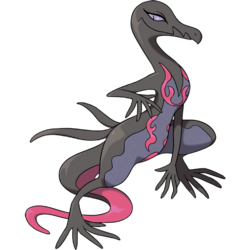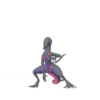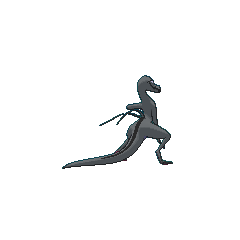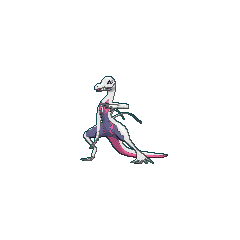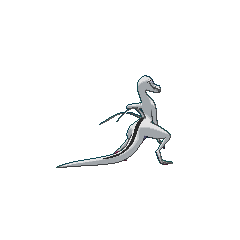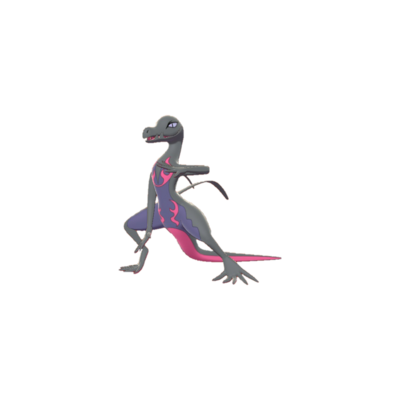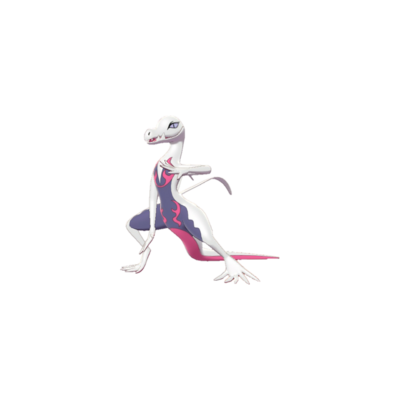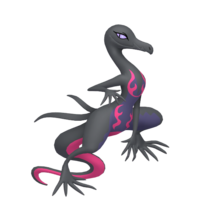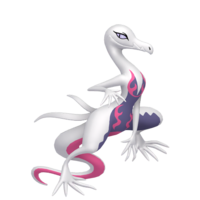From Bulbapedia, the community-driven Pokémon encyclopedia.
Salazzle (Japanese: エンニュート Ennewt) is a dual-type Poison/Fire Pokémon introduced in Generation VII.
It evolves from a female Salandit starting at level 33. Male Salandit are not known to evolve into or from any other Pokémon.
Biology
Salazzle is a dark gray Pokémon resembling a salamander or lizard. Its thin body has a grayish purple underside with several wavy, dark pink markings: a U-shaped marking with two additional lines inside on its chest and one on each hip resembling wisps of smoke. The dark gray on its head and neck extends slightly onto its chest in a V-shape. It has a slender head with purple, almond-shaped eyes with slit pupils and two fang-like projections on each side of its lower jaw. There are two thin, wavy growths on its back at the base of its tail, which is whip-like with a dark pink underside. Its hands and feet each have five long, thin digits, with dark pink palms that can unleash flames. Salazzle is a female-only species with no known male counterpart, as the male Salandit cannot evolve due to malnutrition.
Salazzle can be found deep in caves with a reverse harem of male Salandit. Salazzle emits a poisonous gas that contains sweet-smelling pheromones, which attracts the males. The gas can also be diluted to make perfumes. Salazzle forces the male Salandit it has attracted to serve it and bring it food, and those that are unable to are punished with flaming slaps. Salazzle fight with each other over male Salandit; the winner is the one with the most male Salandit in its harem.
As shown by the core series games since Generation VIII, Salazzle normally stands and walks on all fours, standing on its hind legs only in specific moments such as when battling or interacting with its trainer. Illustrations for the Trading Card Game also show its ability to stick to surfaces with its feet, allowing it to walk on all fours even on vertical and upside-down surfaces.
In Generation IX, Fire Lash is its signature move. Prior to Generation IX, Corrosion was its signature Ability.
Evolution
Salazzle evolves from female Salandit.
In the anime
Major appearances
Salazzle debuted in Rescuing the Unwilling!, under the ownership of Lusamine. With both Salazzle and her Trainer under the influence of a Nihilego, Kiawe volunteered to stay behind and battle Salazzle while Ash and the others continued their pursuit atop Nebby. She was eventually defeated, but in the next episode, Nihilego made her get back up and continue battling until the Ultra Beast was defeated, freeing her from its control.
A Salazzle appeared in Battle Royal 151!, under the ownership of Plumeria. She competed in the Battle Royal round of the Manalo Conference, where she went up against Ilima and his Eevee. Despite Plumeria's efforts, Salazzle was defeated.
Minor appearances
Pokédex entries
| Episode
|
Pokémon
|
Source
|
Entry
|
| SM053
|
Salazzle
|
Rotom Pokédex
|
Salazzle, the Toxic Lizard Pokémon. A Poison and Fire type, and the evolved form of Salandit. Its poisonous gas contains lots of pheromones that attract male Salandit.
|
|
In the manga
Pokémon Adventures
Multiple Salazzle debuted in Homecoming and the Brilliant Professional Golfer, under the ownership of some Team Skull Grunts. They were used to attack Sun and his friends at Memorial Hill.
Plumeria's Salazzle debuted in Flash and Cosmog's Secret, where she attacked Gladion and his Type: Null.
Oleana's Salazzle debuted in PASS25, where she attacked the Galar Gym Leaders trying to climb Rose Tower.
In the TCG
- Main article: Salazzle (TCG)
Game data
Pokédex entries
| This Pokémon was unavailable prior to Generation VII.
|
| Generation VII
|
|
Alola
SM: #162
|
|
Alola
USUM: #196
|
|
Kanto
#—
|
| This Pokémon has no Pokédex entries in Let's Go, Pikachu! and Let's Go, Eevee!.
|
| Sun
|
For some reason, only females have been found. It creates a reverse harem of male Salandit that it lives with.
|
| Moon
|
Filled with pheromones, its poisonous gas can be diluted to use in the production of luscious perfumes.
|
| Ultra Sun
|
Salazzle lives deep in caves and forces the Salandit it has attracted with its pheromones to serve it.
|
| Ultra Moon
|
It punishes Salandit that couldn't bring it food with a fierce slap of its flame-spewing palm.
|
|
|
|
|
| Generation IX
|
|
|
Paldea
#121
|
| Scarlet
|
Salazzle makes its opponents light-headed with poisonous gas, then captivates them with alluring movements to turn them into loyal servants.
|
| Violet
|
When two Salazzle meet, they will use their pheromone gas to fight over the males in each other's group.
|
|
|
Game locations
| This Pokémon was unavailable prior to Generation VII.
|
|
|
|
|
|
|
In side games
| This Pokémon was unavailable prior to Generation VII.
|
| Generation VII
|
|
| This Pokémon is unavailable in Generation VII side games.
|
|
|
|
|
|
|
In events
| Games
|
Event
|
Region
|
Location
|
Level
|
Distribution period
|
| SM
|
Clovis Salazzle
|
American region
|
Online
|
50
|
August 14 to December 4, 2017
|
| SM
|
Clovis Salazzle
|
PAL region
|
Online
|
50
|
August 18 to December 4, 2017
|
Held items
Stats
Base stats
| Stat
|
Range
|
| At Lv. 50
|
At Lv. 100
|
68
|
|
128 - 175
|
246 - 340
|
64
|
|
62 - 127
|
119 - 249
|
60
|
|
58 - 123
|
112 - 240
|
111
|
|
104 - 179
|
204 - 353
|
60
|
|
58 - 123
|
112 - 240
|
117
|
|
109 - 185
|
215 - 366
|
Total: 480
|
Other Pokémon with this total
|
- Minimum stats are calculated with 0 EVs, IVs of 0, and (if applicable) a hindering nature.
- Maximum stats are calculated with 252 EVs, IVs of 31, and (if applicable) a helpful nature.
|
Type effectiveness
| Under normal battle conditions in Generation IX, this Pokémon is:
|
|
|
|
|
|
|
|
|
|
|
|
|
Learnset
|
|
|
|
- Bold indicates a move that gets STAB when used by Salazzle
- Italic indicates a move that gets STAB only when used by an Evolution of Salazzle
- Click on the generation numbers at the top to see level-up moves from other generations
|
|
|
|
|
- Bold indicates a move that gets STAB when used by Salazzle
- Italic indicates a move that gets STAB only when used by an Evolution or an alternate form of Salazzle
- Click on the generation numbers at the top to see TM moves from other generations
|
|
|
|
|
- Moves marked with an asterisk (*) must be chain bred onto Salazzle
- Bold indicates a move that gets STAB when used by Salazzle
- Italic indicates a move that gets STAB only when used by an Evolution of Salazzle
|
|
|
|
|
- Bold indicates a move that gets STAB when used by Salazzle
- Italic indicates a move that gets STAB only when used by an Evolution of Salazzle
|
Side game data
Evolution data
Sprites
| This Pokémon was unavailable prior to Generation VII.
|
|
|
|
|
|
|
|
|
Trivia
Origin
Salazzle appears to be based on a salamander—both the poisonous real kind and the fire-associated mythical kind—and lizards of the Teiidae family, also known as "whiptails". Certain whiptail species have a mostly female population, some species even being female exclusive, one of which is the New Mexico whiptail. It may also be partially based on fire belly newts.
Additionally, it may be inspired by the mo'o, a mythical dragon-like lizard of Hawaiian myth. Generally, mo'o are depicted as large female lizards, which have scales that are black as night, and which would shape-shift into seductive women to devour men. They would also appear when fire was lit near or around their dwellings.
Name origin
Salazzle may be a combination of salamander and dazzle or sizzle.
Ennewt may be a combination of 炎 en (flame) or 艶 en (bewitching) and newt.
In other languages
| Language
|
Title
|
Meaning
|
 Japanese Japanese
|
エンニュート Ennewt
|
From 炎 en or 艶 en and newt
|
 French French
|
Malamandre
|
From mal and salamandre
|
 Spanish Spanish
|
Salazzle
|
Same as English name
|
 German German
|
Amfira
|
From Amphibie and fire
|
 Italian Italian
|
Salazzle
|
Same as English name
|
 Korean Korean
|
염뉴트 Yeomnewt
|
From 염 (炎) yeom or 염 (艷) yeom and newt
|
 Mandarin Chinese Mandarin Chinese
|
焰后蜥 Yànhòuxī
|
From 焰 yàn, 艷后 yànhòu, and 火蜥蜴 huǒxīyì
|
 Cantonese Chinese Cantonese Chinese
|
焰后蜥 Yihmhauhsīk
|
From 焰 yihm, 艷后 yihmhau, and 火蜥蜴 fósīkyihk
|
|
|
|
| More languages
|
 Russian Russian
|
Салаззл Salazzl
|
Transcription of English name
|
 Thai Thai
|
เอ็นนิวท์ Ennio
|
Transcription of Japanese name
|
|
|
|
Related articles
External links

|
This Pokémon article is part of Project Pokédex, a Bulbapedia project that aims to write comprehensive articles on each Pokémon species, as well as Pokémon groups and forms.
|


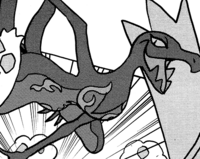
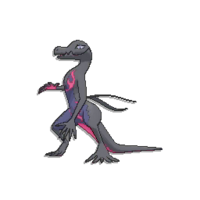
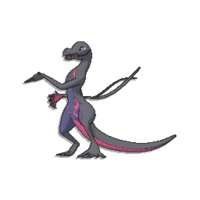
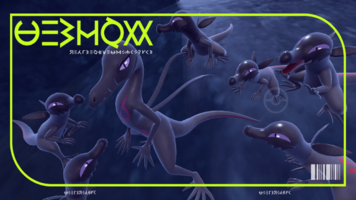
 For other sprites and images, please see Salazzle images on the Bulbagarden Archives.
For other sprites and images, please see Salazzle images on the Bulbagarden Archives.
